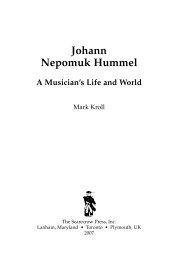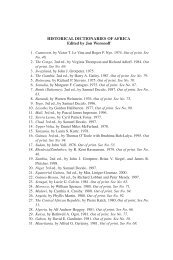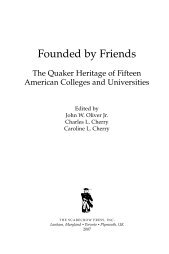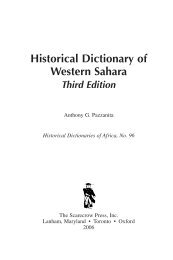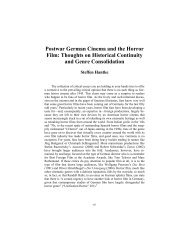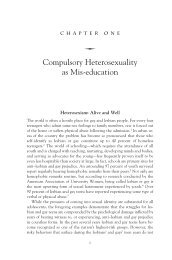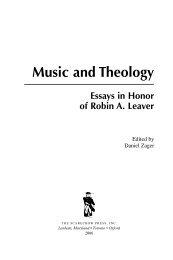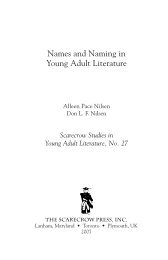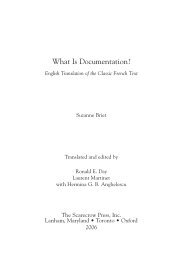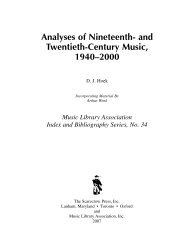Separate Realities: The Dream and the Iceberg - Scarecrow Press
Separate Realities: The Dream and the Iceberg - Scarecrow Press
Separate Realities: The Dream and the Iceberg - Scarecrow Press
You also want an ePaper? Increase the reach of your titles
YUMPU automatically turns print PDFs into web optimized ePapers that Google loves.
46 Chapter 2<br />
for upward mobility for those who embrace a strong work ethic, regardless of<br />
class origins. 5 Although <strong>the</strong> details of <strong>the</strong> dream vary, Americans typically envision<br />
it as including freedom, happiness, family, economic security (an<br />
above-average <strong>and</strong> secure income), higher educational levels (for <strong>the</strong>mselves<br />
<strong>and</strong> <strong>the</strong>ir children), personal fulfillment (a rewarding job), home ownership,<br />
<strong>and</strong> financial success. 6<br />
Somewhat paradoxically, <strong>the</strong> dream runs both parallel with <strong>and</strong> counter to<br />
<strong>the</strong> general trend whereby children tend to replicate <strong>the</strong> class ranking of <strong>the</strong>ir<br />
parents. For privileged-class families, <strong>the</strong> dream offers a reassuring sense of<br />
continuity: <strong>the</strong> advantaged positions of parents can <strong>and</strong> will be passed on to,<br />
<strong>and</strong> extended by, <strong>the</strong>ir children. For working-class families, <strong>the</strong> dream represents<br />
a possible future of reward, fulfillment, <strong>and</strong> affluence, especially for <strong>the</strong>ir<br />
children. To some extent, <strong>the</strong> early post–World War II period seemed to provide<br />
middle-income families with evidence that <strong>the</strong> dream was within reach.<br />
Thus, among members of <strong>the</strong> nonprivileged classes, <strong>the</strong> dream has resonated<br />
powerfully as a mythic cultural ideal <strong>and</strong>, at least for a time, as an attainable<br />
reality. Today, however, <strong>the</strong>re is growing evidence that opportunities for realizing<br />
<strong>the</strong> American <strong>Dream</strong>, especially for those in <strong>the</strong> new working class, are<br />
being shredded by powerful economic, political, <strong>and</strong> cultural forces that are<br />
part of <strong>the</strong> emerging, iceberglike new class society.<br />
<strong>The</strong> purpose of this chapter is threefold. First, we clarify our iceberg<br />
metaphor <strong>and</strong> consider <strong>the</strong> taboo nature of class analysis. Second, we identify<br />
three important “above <strong>the</strong> waterline” trends associated with <strong>the</strong> new class system<br />
that are at odds with <strong>the</strong> ideals of <strong>the</strong> American <strong>Dream</strong>. Third, we consider<br />
two dynamic dimensions of <strong>the</strong> new class system (discussed in detail in later<br />
chapters) that we view as submerged “beneath <strong>the</strong> waterline” of conventional<br />
social analysis: conflicting class interests <strong>and</strong> <strong>the</strong> structures <strong>and</strong> processes that<br />
maintain <strong>and</strong> legitimate <strong>the</strong> class system. Bridging <strong>and</strong> blending elements of<br />
critical sociology, trend analysis, <strong>and</strong> popular culture, this chapter explores <strong>the</strong><br />
social geography <strong>and</strong> dynamic forces at <strong>the</strong> heart of <strong>the</strong> new class society. It previews<br />
<strong>the</strong>mes of power, greed, betrayal, deception, heartbreak, resistance, <strong>and</strong><br />
hope that are central to <strong>the</strong> story of social class in America. As we will see, it is<br />
a twisted tale previewing a long, strange trip intended for travelers, not tourists.<br />
THE THREE-THOUSAND-MILE ICEBERG<br />
<strong>The</strong> first lesson of sociology . . . [is] <strong>the</strong> importance of class consciousness.<br />
—Charles H. Anderson, Toward a New Sociology, 1974<br />
Like a huge iceberg stretching coast to coast across <strong>the</strong> American social horizon,<br />
<strong>the</strong> new class society combines a dramatic profile of sharply defined <strong>and</strong><br />
disturbing visible features with a submerged <strong>and</strong> hidden mass of potentially



